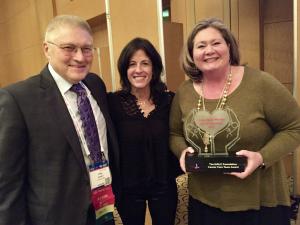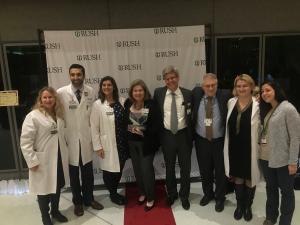 Last month I had the honor of giving a presentation for the International Association of the Study of Lung Cancer (IASLC) Cancer Care Team award at the World Conference on Lung Cancer in Japan. Last week I had the bigger honor of speaking at the Shine a Light lung cancer awareness month event at my hospital, Rush University Medical Center (Rush), where I spoke directly to my team about why they won this meaningful award. It is not easy to find words to explain the significance of this award, why it’s so important, and how deserving my team is, but I tried.
Last month I had the honor of giving a presentation for the International Association of the Study of Lung Cancer (IASLC) Cancer Care Team award at the World Conference on Lung Cancer in Japan. Last week I had the bigger honor of speaking at the Shine a Light lung cancer awareness month event at my hospital, Rush University Medical Center (Rush), where I spoke directly to my team about why they won this meaningful award. It is not easy to find words to explain the significance of this award, why it’s so important, and how deserving my team is, but I tried.
Lung Cancer Care Team Award:
With the science around lung cancer research continuously progressing, it is important to IASLC to stay on top of the latest advances in order to provide the best outcomes to patients and their families. The IASLC Foundation is an integral part in this progression.
The IASLC Foundation Cancer Care Team Award was created to recognize and award outstanding patient care around the world. It aims to honor multidisciplinary teams working together to provide the highest quality care. Nominations from patients and/or loved ones were accepted from all over the world. There were five winners total and Rush was one of two winners from North America, receiving a total of 10 nominations.
Patient Perspective:
Hearing the words ‘you have lung cancer’ is one of those things you can’t understand unless you have lived it. But imagine you are going about your everyday life and suddenly you are drop-kicked into a foreign country; you don’t know the language, the culture is unfamiliar, you don’t know what’s expected of you, you don’t have a map — and yet you need to figure out how to survive. Now imagine how overwhelming it would be to navigate this foreign territory alone. On the flipside, think about how different your experience would be if there was a team of experts waiting to help you with all of the above.
As patients, we are ‘dropped kicked’ into a lung cancer diagnosis. There is no ‘planned patienthood’ and no one trains us on how to be a patient - and yet we need to figure out how to survive. We need a team of experts, a medical village, to help us with the language, culture, unfamiliarity, etc.
Pilots don’t take off without a flight plan, communication on all ends, safety checked and everyone onboard -- one mistake and people can die. As we patients take off on the biggest journey of our lives, we need the same kind of planning, scrutiny and collaborative efforts - our lives depend on it.
There are so many buzz words flying around like patient-centered care, shared decision making, value-based care, etc., but what do they mean and what do they look like in a clinical setting? It’s pretty simple -- they mean putting patients in the center, NOT the middle. There’s a difference. When patients are in the middle they are forced to navigate a fractured system and can fall through the cracks. When patients are in the center, care is organized around them. Patients need to know they are being heard, and they need to be involved in their care. It’s not a new idea, there’s just ambiguity surrounding the definition, and there shouldn’t be when the difference is someone’s life.
My Team:
When I say team, I mean it. My cancer care team is comprised of doctors, nurses and staff from many disciplines and departments who all play an important part in my journey from coordinating appointments, to doing blood work, reading scans, developing treatment plans, mapping for radiation treatment and performing surgery.
Treating lung cancer is more complex and complicated than ever before and scientific evidence is often incomplete or conflicting, making a team approach to management an integral part of care. Knowledge, experience, access to research and cutting edge treatment are all important in providing the ‘best’ care, but my team believes that the patient’s spirit, family, dignity and goals are just as important. They embrace the art of medicine — the art of caring. That’s humanity. That makes a difference. That is what makes my team stand out.
When I was diagnosed, my biggest fear was that my kids would have to go through what I went through and suffer the loss of a parent at a young age. From day one my team has understood that and known that my preferences for treatment had to be guided by the impact it would have on my family, and at times that has meant not following the traditional approach or standard of care.
It happened at my first consult when Dr. Bonomi, my oncologist, changed his mind on whether or not he would recommend adjuvant therapy after my first surgery. I remember my uncle asking, “What makes you change your mind?” Dr. Bonomi’s response was, “Jill’s my patient and I think her emotional well-being is just as important as her physical.” It was that moment when I realized what getting the best care really meant.
And the care extends beyond the clinic. Lung cancer is their job, and it’s a hard one. But beyond their profession, they act on their passion to raise awareness for lung cancer. Despite watching the disease destroy, debilitate and take the lives of their own loved ones and patients they grow to love and care about, ‘off the clock’ they still advocate for us. To be able to maintain this dedication through so much devastation all these years is true compassion that CANNOT be learned.
And Dr. Bonomi… He is kind of a big deal! I knew that, but heard about it more from his colleagues in Japan. But he is a bigger deal to his patients. Whether it’s 5am, 9:30pm or when that exam room door closes — the outside world stops existing for as long as we patients need. Medical care is important, but his genuine care, patience, compassion, thoughtful conversation and interest in us is what provides strength and instills hope in his patients. And up until recently there wasn’t much hope, yet Dr. Bonomi has always been the eternal optimist.
He is a true leader in the field, both as a physician and as a model of humane, compassionate care. I know that the culture that exists at Rush, the philosophy of care that is reflected by all of the staff, who all have the patient in the center, is a result of Dr. Bonomi’s leadership and guidance.
 Rush has received accolades and been recognized nationally as a top hospital on many levels, and that is well-deserved. But this award is not about collective data or statistics. Medical professionals treat people, not data or statistics. The IASLC Foundation Cancer Care Team Award is about heartfelt nominations from patients and their families, all of us with our own set of fears and needs that they recognize and respond to in the special care we have received. My team won this award based on real life testaments of the care they provide every day, which may or may not be life-saving, but is always life-changing.
Rush has received accolades and been recognized nationally as a top hospital on many levels, and that is well-deserved. But this award is not about collective data or statistics. Medical professionals treat people, not data or statistics. The IASLC Foundation Cancer Care Team Award is about heartfelt nominations from patients and their families, all of us with our own set of fears and needs that they recognize and respond to in the special care we have received. My team won this award based on real life testaments of the care they provide every day, which may or may not be life-saving, but is always life-changing.
Patch Adams said it best, “You treat a disease, you win, you lose.” “You treat a person, you win — no matter the outcome!”
And that is why my cancer care team won and will win with every person they care for…who has lung cancer.
